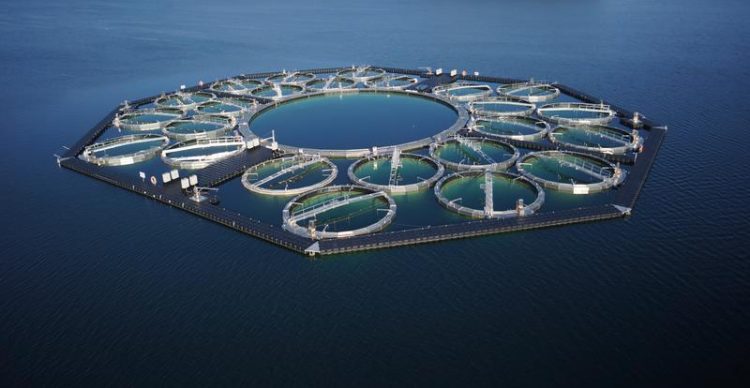International network connects experimental research in European waters

The experimental infrastructures also include the IGB-LakeLab in Lake Stechlin with its unique dimension (24 mesocosms with 1,270 m3 each). © HTW Dresden/Oczipka
“For more than 100 years, inland water and marine research have largely developed in parallel to each other. Now it's time to reunite both”, says IGB researcher Jens Nejstgaard, who leads the new EU project. In AQACOSM scientists from both disciplines are building an integrated, international network of experimental infrastructures. Their aim is to significantly improve the quality of experimental data for all types of water.
“We want to better coordinate international large-scale experimental research projects, develop good practices together, and open up the freshwater and marine mesocosm research infrastructures for a broader international, interdisciplinary collaboration”, says Jens Nejstgaard.
Mesocosms are containers in which large volumes of water including the natural organisms is experimentally enclosed and manipulated. In this way effects of individual and combined stress factors can be tested on entire ecosystems over weeks to years.
Within the project AQUACOSM researchers will examine how different aquatic ecosystems react to environmental impacts caused by global climate change and the increasing pressure by the growing world population.
“The impact of these stress factors can vary widely within different ecosystems and seasons”, emphasizes Nejstgaard. Therefore they have to be investigated in different climatic and geographic regions, using comparable mesocosm experiments and measurement methods. AQUACOSM offers the necessary research infrastructures to do experimental research in a range of different European water types, in climatic and geographic zones stretching from the Arctic to the Mediterranean.
The experimental infrastructures of the 21 partner institutions include, for example, tank systems and flow channels on land, such as in Lunz am See (Austria) and large free-floating open-ocean facilities such as The Kiel Offshore Mesocosms (KOSMOS). The IGB-LakeLab in Lake Stechlin also set a new benchmark in experimental freshwater research with its unique dimension (24 mesocosms with 1,270 m3 each).
Launched in January 2017, the AQUACOSM project runs until December 2020 and is unique in size and approach. It is supported by the European Union H2020-INFRAIA Project No. 731065 with a budget of € 9,999,807.
Further information is available at http://www.aquacosm.eu
Contact persons:
Dr. Jens C Nejstgaard
Project Leader/Coordinator
Leibniz-Institute of Freshwater Ecology and Inland Fisheries (IGB)
Nejstgaard@igb-berlin.de
Tel: +49 33082 699 40
Dr. Stella A Berger
Transnational Access Coordinator
Leibniz-Institute of Freshwater Ecology and Inland Fisheries (IGB)
Berger@igb-berlin.de
Tel: +49 33082 699 41
Dr. Paraskevi Pitta
Dissemination Coordinator
Hellenic Center for Marine Research, HCMR, Greece
Vpitta@hcmr.gr
Tel: +30 2810 337829
Further information on the Leibniz-Institute of Freshwater Ecology and Inland Fisheries (IGB):
Work at IGB combines basic research with preventive research as a basis for the sustainable management of freshwaters. In the process, IGB explores the structure and function of aquatic ecosystems under near-natural conditions and under the effect of multiple stressors. Its key research activities include the long-term development of lakes, rivers and wetlands under rapidly changing global, regional and local environmental conditions, the development of coupled ecological and socio-economic models, the renaturation of ecosystems, and the biodiversity of aquatic habitats. Work is conducted in close cooperation with universities and research institutions from the Berlin/Brandenburg region as well as worldwide. IGB is a member of the Forschungsverbund Berlin e.V., an association of eight research institutes of natural sciences, life sciences and environmental sciences in Berlin. The institutes are members of the Leibniz Association.
Media Contact
All latest news from the category: Ecology, The Environment and Conservation
This complex theme deals primarily with interactions between organisms and the environmental factors that impact them, but to a greater extent between individual inanimate environmental factors.
innovations-report offers informative reports and articles on topics such as climate protection, landscape conservation, ecological systems, wildlife and nature parks and ecosystem efficiency and balance.
Newest articles
Faster, more energy-efficient way to manufacture an industrially important chemical
Zirconium combined with silicon nitride enhances the conversion of propane — present in natural gas — needed to create in-demand plastic, polypropylene. Polypropylene is a common type of plastic found…

Energy planning in Ghana as a role model for the world
Improving the resilience of energy systems in the Global South. What criteria should we use to better plan for resilient energy systems? How do socio-economic, technical and climate change related…

Artificial blood vessels could improve heart bypass outcomes
Artificial blood vessels could improve heart bypass outcomes. 3D-printed blood vessels, which closely mimic the properties of human veins, could transform the treatment of cardiovascular diseases. Strong, flexible, gel-like tubes…





















